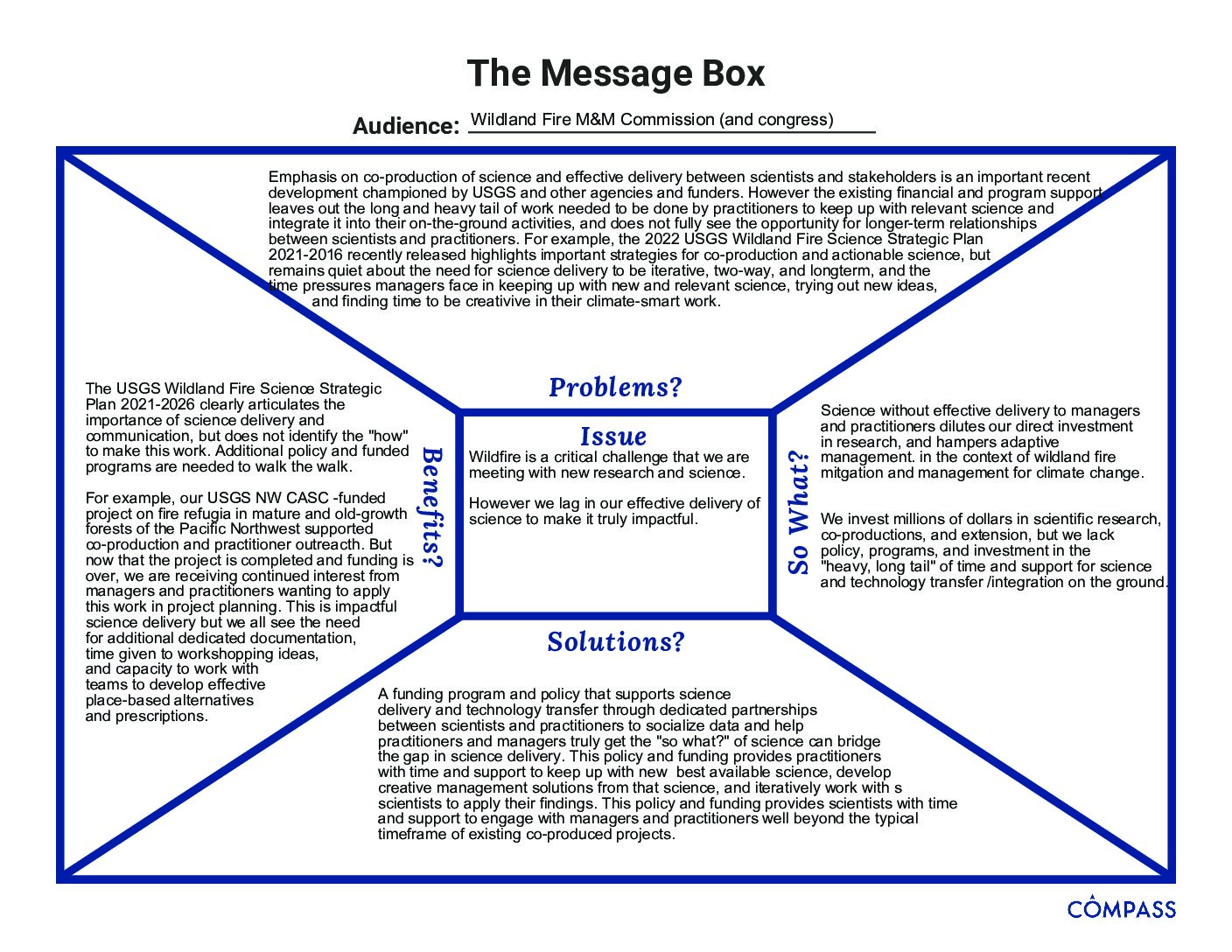Dr. Meg Krawchuk’s Message Box
Dr. Meg Krawchuk is a fire ecologist who specializes in forest disturbance, the spatial distribution of fire, and cultural and land management decisions. She leads the Landscape Fire and Conservation Science Research Group at Oregon State University. She worked on her Message Box at the Wildland Fire Policy Accelerator, a collaboration with the Federation of American Scientists, Conservation X Labs, and the California Council on Science and Technology to help scientists draft recommendations for the Wildland Fire Mitigation and Management Commission.
Dr. Krawchuk’s Message Box addresses a key, simple issue: that science and forest and wildland fire management are often disconnected from one another, leading to a failure to integrate the most up-to-date science and data with on-the-ground efforts. By iterating on her Message Box through successive drafts and consultation with policy and communications experts, Dr. Krawchuk distilled her message into an actionable policy recommendation. To read the full recommendation please visit FAS’ Wildland Fire Recommendations. Dr. Krawchuk’s recommendation is located under the “Science, Data, and Technology” heading.
Read Transcribed Message Box Here
Dr. Tessa Hill’s Message Box
Audience: Wildland Fire M&M Commission (and congress)
Issue: Wildfire is a critical challenge that we are meeting with new research and science. However we lag in our effective delivery of science to make it truly impactful.
Problems?
Emphasis on co-production of science and effective delivery between scientists and stakeholders is an important recent development championed by USGS and other agencies and funders. However the existing financial and program support leaves out the long and heavy tail of work needed to be done by practitioners to keep up with relevant science and integrate it into their on-the-ground activities, and does not fully see the opportunity for longer-term relationships between scientists and practitioners. For example, the 2022 USGS Wildland Fire Science Strategic Plan 2021-2016 recently released highlights important strategies for co-production and actionable science, but remains quiet about the need for science delivery to be iterative, two-way, and longterm, and the time pressures managers face in keeping up with new and relevant science, trying out new ideas, and finding time to be creative in their climate-smart work.
Benefits?
The USGS Wildland Fire Science Strategic Plan 2021-2026 clearly articulates the importance of science delivery and communication, but does not identify the “how” to make this work. Additional policy and funded programs are needed to walk the walk.
For example, our USGS NW CASC -funded project on fire refugia in mature and old-growth forests of the Pacific Northwest supported co-production and practitioner outreacth. But now that the project is completed and funding is over, we are receiving continued interest from managers and practitioners wanting to apply this work in project planning. This is impactful science delivery but we all see the need for additional dedicated documentation, time given to workshopping ideas, and capacity to work with teams to develop effective place-based alternatives and prescriptions.
Solutions?
A funding program and policy that supports science delivery and technology transfer through dedicated partnerships between scientists and practitioners to socialize data and help practitioners and managers truly get the “so what?” of science can bridge the gap in science delivery. This policy and funding provides practitioners with time and support to keep up with new best available science, develop creative management solutions from that science, and iteratively work with s scientists to apply their findings. This policy and funding provides scientists with time and support to engage with managers and practitioners well beyond the typical timeframe of existing co-produced projects.
So What?
Science without effective delivery to managers and practitioners dilutes our direct investment in research, and hampers adaptive management. in the context of wildland fire mitgation and management for climate change.
We invest millions of dollars in scientific research, co-productions, and extension, but we lack policy, programs, and investment in the “heavy, long tail” of time and support for science and technology transfer /integration on the ground.
